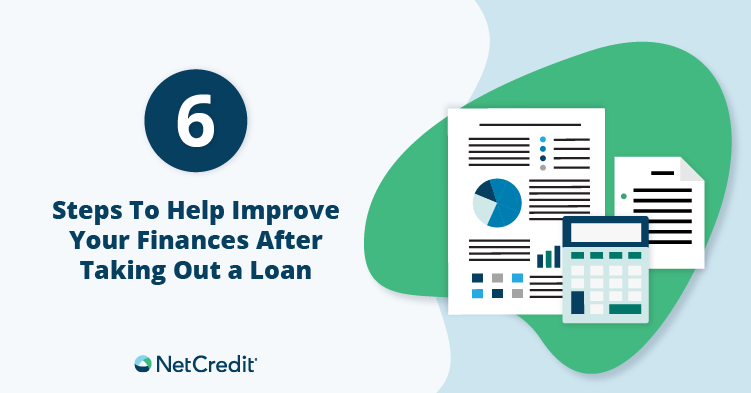Taking out a loan can be a major decision. If you were in a less-than-ideal monetary situation before applying for funding, now is a great time to take steps to improve your financial health. Read our guide for six suggestions on how to move forward financially after taking out a loan.
1. Stick To a Budget
One of the most important ways to improve your finances after taking out a loan is to stay on a budget. Although some lenders like NetCredit offer flexible repayment options, incorporating this expense into your budget may take some adjustments. The following tips and tools can help you keep your budget on track:
- Use technology to manage your money: These free budgeting templates and online tools are a great way to manage your money while you’re on the go.
- Keep track of loan repayments with a convenient smartphone app: You can stay on top of payments and access your account with the free NetCredit smartphone app.
- Contact your lender if you need help managing payments: Plan ahead and call your lender if you’re in danger of falling behind on payments. Staying on top of your payments can help you protect your credit score as you repay the loan.
Read more tips on how to make loan repayment easier.
2. Utilize Free Financial Resources
NetCredit offers a variety of free resources to help you get your finances back on track. You can check out our blog, featuring helpful tools including an online budget calculator, informative financial guides and tutorials. Or, you can find local resources with SpringFour, such as job assistance and unemployment services, monthly savings programs and more.
3. Increase Your Savings Rate
A well-funded emergency savings account can help prevent monetary setbacks in the future. Setting a savings goal helps to focus your efforts and motivate you to succeed. Though most financial experts recommend saving roughly three to six months’ worth of expenses, individual needs will vary. If you don’t have any money saved, you can start with a smaller savings goal of about $1,000, and build it up from there.
Saving money automatically is one of the best ways to put money away over time. Read this helpful savings guide if you need help building your emergency fund.
4. Lower Your Monthly Bills
Reducing your monthly expenses is a great way to keep more money in the bank. While some expenses are nonnegotiable, you likely have some room to lower or eliminate other monthly costs. The following suggestions can help you discover ways to reduce spending even further:
- Memberships: From television and streaming subscriptions to music and other paid memberships, comb through your recurring monthly charges to help identify costs you can eliminate. Ideally, you can replace some expenses with free entertainment and other local resources, such as a public library.
- Food: Aim to save money by shopping in season and with coupons at the grocery store. Cutting back or eliminating restaurant food is another great way to save.
- Utilities: Incorporating green or “smart” home features can help you save money on utilities each month. Some cost-effective options include renewable home insulation, energy-saving window curtains or blinds and smart utility meters.
5. Improve or Maintain Your Credit Score
Your credit score is one of the most important factors in your overall financial health. Good credit can help you save money, secure a job, rent an apartment and more. Although several financial factors affect your credit score, making on-time payments and maintaining a low credit utilization ratio are two of the best ways to raise or maintain your credit score over time. Make sure to keep an eye on your credit rating, and monitor your credit score for free.
6. Plan for the Future
Although we aim to save money and budget our finances, unexpected bills can still come our way. If your emergency savings fund doesn’t have as much as you need to pay for unplanned expenses, it’s helpful to have another funding option ready to use. If you don’t have some form of revolving credit, you may want to apply for a line of credit or credit card. With a NetCredit line of credit, you only pay interest on the amount that you borrow. Having a backup option means you can be prepared for the next surprise bill.
The information in this article is provided for educational and informational purposes only, without any express or implied warranty of any kind, including warranties of accuracy, completeness or fitness for any particular purpose. The information in this article is not intended to be and does not constitute financial, legal or any other advice. The information in this article is general in nature and is not specific to you the user or anyone else.






